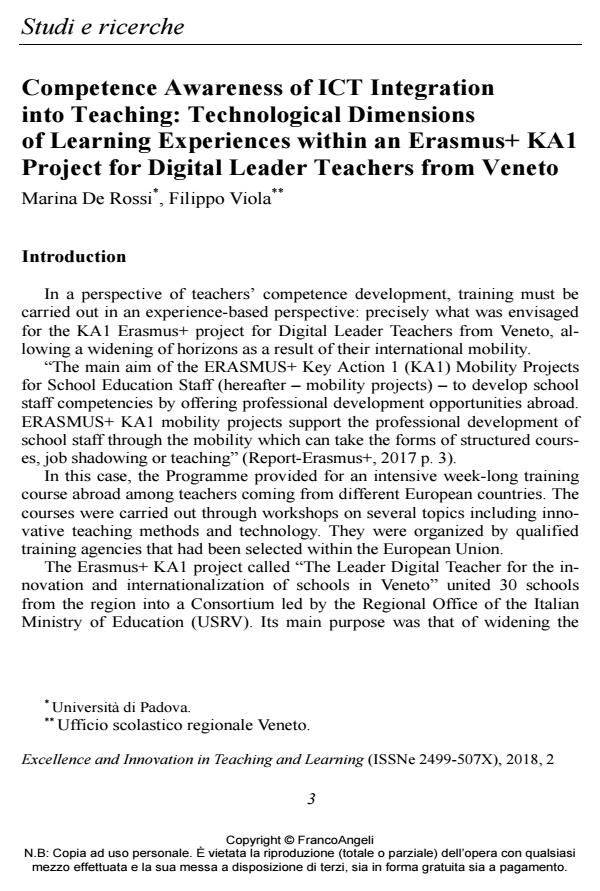Competence Awareness of ICT Integration into Teaching: Technological Dimensions of Learning Experiences within an Erasmus+ KA1 Project for Digital Leader Teachers from Veneto
Journal title EXCELLENCE AND INNOVATION IN LEARNING AND TEACHING
Author/s Marina De Rossi, Filippo Viola
Publishing Year 2018 Issue 2018/2
Language English Pages 17 P. 3-19 File size 389 KB
DOI 10.3280/EXI2018-002001
DOI is like a bar code for intellectual property: to have more infomation
click here
Below, you can see the article first page
If you want to buy this article in PDF format, you can do it, following the instructions to buy download credits

FrancoAngeli is member of Publishers International Linking Association, Inc (PILA), a not-for-profit association which run the CrossRef service enabling links to and from online scholarly content.
This article provides an analysis of data extracted from specific sections of a semi-structured questionnaire filled in by 29 Expert Leader Teachers (Animatori Digitali or AD in Italian) taking part in an Erasmus+ KA1 Project before and after their mobility abroad. These teachers were asked to answer questions concerning the Didactic Dimension, the Professional Managing Context, ICT in Education, Data Processing, Communication, and Content Creation, to the purpose of assessing how their competences had improved in consequence of their experience in the Erasmus+ project. Through a mix-method process, combining the analysis of questionnaires and the reports by the teachers after their mobility abroad, it was possible to compare quantitative and qualitative data with reference to emerging significant categories in the relevant dimensions. Research showed that Erasmus+ mobility had a positive effect on teachers’ awareness of the importance of ICT for education in a European dimension with a significant increase in values on a 3-graded Likert scale concerning such items as "I can exploit ICT potential to create effective exchanges with colleagues from other countries" (+22,5%), and "I can promote ICT use so that it gives an added value to teaching and learning" (+11,8%). Such positive outcomes were confirmed from a qualitative analysis of teachers’ reports on their experiences abroad: the most relevant concepts found in text corpus showed teachers’ increased awareness of their competences in all the dimensions considered.
Keywords: ICT, innovation, didactics, competences, teaching training
- Bilişim Teknolojileri İçerikli Erasmus Projeleri Hakkında Ülkelerarası Öğretmen Görüşlerinin İncelenmesi Yasemin KARACA, Muammer KARACA, Fatma Zeynep ER, Mehmet Emre KAZANCI, in Korkut Ata Türkiyat Araştırmaları Dergisi /2024 pp.1271
DOI: 10.51531/korkutataturkiyat.1418767
Marina De Rossi, Filippo Viola, Competence Awareness of ICT Integration into Teaching: Technological Dimensions of Learning Experiences within an Erasmus+ KA1 Project for Digital Leader Teachers from Veneto in "EXCELLENCE AND INNOVATION IN LEARNING AND TEACHING" 2/2018, pp 3-19, DOI: 10.3280/EXI2018-002001